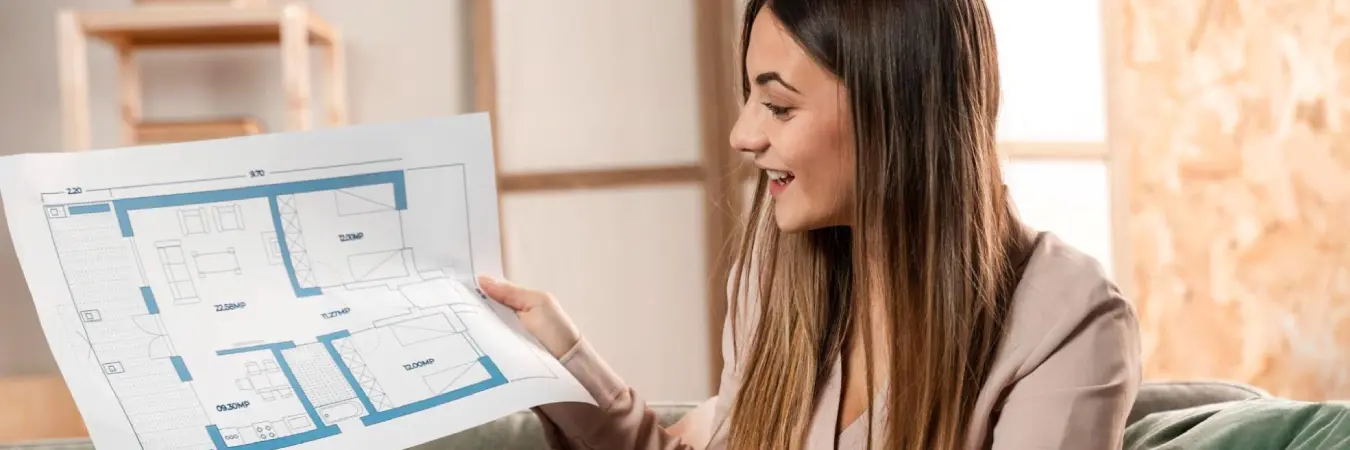Which Floor is Best According to Vastu Shastra?
Table Of Contents
In this hustle and bustle of an era, many people still consider a proper Vastu of a place before purchasing a particular property. Vastu Shastra principles are a major factor for many when choosing their dream flat, among the many other things to take into account. Now, looking at Vastu is important but, we should also focus on the direction of the flat as well as the floors of the apartment. Why? Different energies are linked to each direction and floor, which affects things like prosperity, health and good fortune. By facing in the right direction, you can attract positive energy into your home. This blog explores the idea of which floor is best in apartment according to Vastu, guiding you in creating a harmonious and well-balanced home.
Vastu Shastra: The Basis for Tranquility
The ancient Indian architectural and design approach known as Vastu Shastra, which translates literally as “science of dwellings,” places a strong emphasis on the underlying energies that infiltrate our environment and have an impact on our lives. Vastu tries to produce a positive flow of energy, fostering good health, wealth and general well-being within a dwelling by carefully planning spaces and following specified norms. You can make well-informed selections regarding your living environment and possibly promote peace, wealth and well-being by learning about the Vastu for apartments.
A Vastu Approach to Selecting the Ideal Floor
Although Vastu provides a great deal of advice on many different areas of living spaces, choosing which floor is best in an apartment is frequently a source of wonder. It’s important to know that Vastu emphasises the possible energetic influences connected to many levels in a building rather than prescribing a single “perfect” floor.
The Basics of Vastu Shastra for Apartments
The Elements of Vastu Shastra for Flats
Vastu places a strong emphasis on the harmony of the five elements—earth, water, fire, air and space—in a home. This state of harmony is said to produce a beneficial energy flow that affects the residents’ well-being. People who follow the advice of Vastu seek to create a space that minimises potential imbalances and concentrates on positive energy.
Importance in Contemporary Life
Vastu principles can be implemented in modern flat living, even though they are typically used for independent dwellings. You can make well-informed decisions when working with the constraints of flat layouts if you comprehend the basics.
Is Vastu Applicable to Flats? Taking Facts and Myths Apart
It’s a frequent misperception that apartments are exempt from Vastu. Nevertheless, within the confines of flat layouts, Vastu principles can also be efficiently implemented in apartments to optimise energy flow. Remember that Vastu is a guiding tool, not a strict set of rules.
Understanding Floors in Vastu
The “floor in Vastu” has power because of its relationship to the elements and where it is in the building’s energy field. The following summarises how living on different floors can affect you:
Ground Floor:
It is thought to be most closely related to the earth element, which promotes stability and anchoring energy. Nonetheless, issues like security and noise may need to be resolved.
Floors One, Two and Three:
Because these levels are in closer contact with the earth and water elements, they are seen to be fortunate because they encourage good energy flow and tranquillity in the home.
Fourth Floor and Above:
Living on the upper floors have several advantages and a different perspective. Even if the physical connection to the earth and water components may be compromised it could cause a feeling of separation or loneliness. However, Using earthy hues and textures in your interior design might help you feel more connected to the earth. The elevated viewpoint offers an abundance of natural light, panoramic views of the surrounding landscape and stunning cityscapes. This may give rise to sensations of openness, liberation and a sense of oneness with the expanse of the sky and the surroundings. Moreover, cleaner air and quieter settings are frequently found on higher floors, which adds to the feeling of calm and peace.
Total Number Of Floors:
Vastu also places importance on a building’s total number of floors. According to Vastu principles, it is preferable to select buildings with odd floor counts because of their capacity to encourage a more lively and dynamic flow of energy. It is thought that doing this encourages residents to feel more creative, active and well-being.
Which Floor is Best According to Vastu?
Although the subject of “ground floor vs. higher floors” is debatable, the best floor will ultimately depend on your unique needs and preferences. Here is a summary to help you make your choice:
Lower Levels (First, Second and Ground Floors):
Because they are closest to the earth element, which promotes a sense of solidity and foundation, these floors are regarded by Vastu as the best floor in an apartment. Lower floors also generally provide better security and are easier to reach.
Levels 3 And 4 In The Middle:
Because they preserve the harmony between the earth and air elements, these floors are also said to be beneficial because they encourage concentration and mental clarity.
Upper Levels (Fifth Floor and Up):
Although they could be more difficult to connect with the earth element, higher floors have many benefits due to their elevated height. A sense of serenity and a sense of oneness with the grandeur of the surrounding terrain can be fostered by the panoramic vistas they offer, which can be immensely uplifting and inspiring. A sanctuary of solitude can also be provided by the greater privacy that is frequently found on higher floors, making them perfect for people looking for a calm and serene living space. But vastu for apartments offers versatility and respects contemporary tastes. Vastu principles can be used to balance the interior layout of apartments on higher floors. Connected with the possibility of more social engagement, openness and wide perspectives. Might be appropriate for people looking for a more lively and engaging setting.
Ground Floor And Top Floor Advantages And Disadvantages.
Ground Level:
Benefits
Greater earth connection: Vastu stresses the need to have a connection to the earth for stability and balance.
Drawbacks:
Security concerns: It’s commonly accepted that ground floors are more susceptible to burglaries, particularly when appropriate security measures aren’t taken.
Top Floor:
Benefits:
Unobstructed views and ample sunlight: Top floors typically offer panoramic views and receive more natural light, which can be uplifting and create a sense of spaciousness.
Drawbacks:
Accessibility challenges: Dependence on elevators can be inconvenient, especially during power outages or maintenance. Evacuation during emergencies can also be more challenging from higher floors.
Directional Importance in Vastu for Apartments
Vastu emphasises which facing flat is good and the importance of flat orientation and direction. The effects of various flat vastu directions are broken down as follows:
East-Facing:
Highly fortunate, thought to bring prosperity, health and spiritual development.
West-Facing:
Linked to affluence, tranquillity and mental clarity.
North-Facing:
This orientation is generally regarded as less favourable, however, with careful Vastu planning, it can be balanced.
South-Facing:
Bedrooms facing north or south-east should be avoided as this can cause health problems and domestic disputes.
Main Door Vastu for Flats
The Vastu of an apartment’s main door is quite important. The following are some essential ideas:
Positioning:
The east, north or northeast zones are where the main door should ideally be situated.
Design:
Avoid doors that are cracked or face unfavourable objects such as dustbins or sharp corners.
Entrance:
Make sure the entryway is welcoming, well-lit and clear of clutter.
Tips for positioning and designing the main entrance as per Vastu.
Let’s examine the flat entrance as per Vastu before moving on to the best floor plan. As the entryway to your house, the main entrance greets both visitors and vitality. Here are some important Vastu guidelines to think about:
Direction:
The main door should face either in the north direction or in the east direction. These directions are linked to optimism, fresh starts and well-being.
Positioning:
A conflict in energy flow may arise if the main door is positioned directly across from the back door.
Design Of The Door
Choose a sturdy wood door that has a swastika an “Om” or another positive symbol.
Lighting And Cleanliness:
Make sure your front entrance is clean, well-maintained and gets enough natural light.
Vastu Tips for Buying a New Flat
Size and Form:
Choose an apartment that is either square or rectangular in shape. Stay away from flats with cuts or expansions since they can interfere with the flow of energy.
Room Locations:
The living room should ideally be in the east, north or northeast according to flat vastu directions. The most optimal directions for bedrooms are northwest, west or southwest. It is recommended that the bathroom be located in the northwest and the kitchen in the southeast.
Openings and Balconies:
Proper placement of openings such as windows is important to encourage natural light and ventilation and balconies are fortunate in the north and east.
Bathrooms and Toilets:
Toilets should not be located in the apartment’s southwest or northeast corners.
How to Check Vastu for Flat – A Beginner’s Guide
If you’re not sure about the Vastu for your flat, you can use internet resources to learn the fundamentals or speak with a Vastu specialist. Here’s an easier method:
Determine The Four Cardinal Directions:
Find the north, south, east and west directions of your flat with a compass.
Verify The Location and Orientation of The Main Door:
Make sure the placement stays away from negative directions and aligns with the suggested directions.
Examine The Design of The Space:
Check to see if the rooms are situated in the appropriate zones (the master bedroom is in the southwest and the pooja room is in the northeast).
Vastu for Apartment Interiors
Vastu principles can be applied to the interior of your flat to further improve your living space once you’ve selected the appropriate floor plan. Here are a few Vastu suggestions tailored to each room:
Kitchen:
The washbasin should be placed in the northeast corner and the stove in the southeast.
Bedroom:
With the headboard pressed up against the wall, arrange the bed towards either the south or the west.
Living Area:
Refrain from setting up the TV in the southwest corner. If you are seated, choose to be in the north or east.
Bathroom:
To avoid bad energy, make sure the toilet seat lid is constantly closed.
Remedies and Solutions
It’s crucial to realise that not every flat will necessarily precisely follow every Vastu concept. But Vastu’s adaptability is what makes it so beautiful. Consider the following Vastu remedies:
Mirrors:
Mirrors arranged strategically can boost the flow of positive energy and reflect negative energy.
Plants:
Specific plant placements help balance the elements and encourage positive energy.
Gemstones and Crystals:
It is said that some crystals and gemstones have distinct energies that are advantageous in certain situations.
Mantras & Chanting:
It is said that certain prayers and chants related to Vastu can foster a calm and upbeat environment.
FAQs
-
Can Vastu defects be corrected without structural changes?
Yes, it is possible to address Vastu faults in many circumstances without having to make major structural adjustments. An apartment’s Vastu can be greatly enhanced by implementing the recommended cures, which include employing mirrors, plants and crystals, concentrating on positive energy and keeping the area tidy and clutter-free.
-
How does Vastu impact the energy of a flat?
According to Vastu principles, the arrangement and style of a living area can affect how energy flows through it. People who adhere to Vastu principles want to establish a harmonious and good energy flow that fosters prosperity and well-being for the occupants.
-
Tips for renters to improve Vastu without renovations.
Vastu principles can still be advantageous to renters:
- Mirrors can be carefully placed to improve space and light.
- A bowl of salt can be placed next to the door to absorb bad energy.
- Hang wind chimes at the front door to encourage the flow of good energy.
- To filter the air and create a relaxing ambience, use plants and essential oils.
Conclusion
A crucial first step towards creating a peaceful and happy living space is determining which floor to use based on Vastu principles. But it’s crucial to keep in mind that Vastu principles are supposed to serve as a guide rather than a strict set of rules. Prioritise your wants and preferences while choosing an apartment, taking into account the principles of Vastu to build a sanctuary that is in harmony with your overall well-being. You can start your quest for the ideal apartment, one that supports your bodily and spiritual well-being, by combining these age-old lessons with contemporary concerns.
Disclaimer: Stock image used for representational purpose only.


